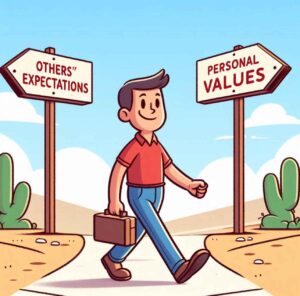Welcome Blessings!
(Tap 🔽 to see more topics!)


How to break free from the chains of others’ opinions? Do you often feel trapped by the fear of what other people think of you? Have you let their opinions dictate your actions, choices, or appearance? Do you hide your true self behind a mask of conformity and perfectionism? Many people suffer from the fear of judgment, which can prevent them from living freely and pursuing their dreams.
The good news is you can break free from the chains of others’ opinions and liberate yourself from their influence. But how to break free from the chains of others’ opinions?

One of the reasons why we care about what other people think is that we want to avoid conflict, rejection, or criticism. We believe that if we can always do the right thing, we will be worthy of love and respect.
But the truth is that we can’t control or please everyone, no matter how hard we try. There will always be someone who disagrees with us, dislikes or misunderstands. And that’s okay. We don’t need everyone’s approval or validation to be happy. We only need our own and those who genuinely appreciate us. As Dr. Seuss said, “Be who you are and say what you feel because those who mind don’t matter, and those who matter don’t mind.”
According to research, trying to please everyone can lead to increased stress, lower self-esteem, and reduced well-being. Instead of seeking external validation, we should focus on our values and preferences and act in ways that are consistent with them.
Another reason why we care about what other people think is we assume they are constantly watching, evaluating, or judging us. We imagine they notice every flaw, mistake, or weakness that we have. But the reality is that most people need to be more relaxed with themselves to pay much attention to us. They have problems, worries, and insecurities. Surprisingly, they are less focused on us than we think. And even if they do notice or care about us, their opinions are not as important as ours. As Eleanor Roosevelt said, “You wouldn’t worry so much about what others think of you if you realized how seldom they do.”

Research shows that people overestimate how much others observe and evaluate them, a phenomenon known as the spotlight effect. We tend to assume that others think and feel the same way we do, which can lead us to project our thoughts and feelings onto them. However, most people are more concerned with themselves than us, and they may not even remember or care about what we do or say.
We may believe that other people have more experience or knowledge than we do; thus, their opinions are more valid. Besides, we think they know better than us and have the authority to define us. But the truth is that people’s opinions are not facts but reflections of their perspectives and biases. They are not objective or universal truths. They are not who we are. As Marcus Aurelius said, “Everything we hear is an opinion, not a fact. Everything we see is a perspective, not the truth.”

Research suggests that people’s judgments are often affected by various cognitive biases and heuristics, such as confirmation bias (seeking information that supports one’s existing beliefs), halo effect (forming an overall impression based on a single trait), and availability heuristic (basing judgments on the ease of recalling examples). These biases can lead to inaccurate or unfair evaluations of ourselves and others.
We follow their expectations and standards rather than our values and goals. In addition, we fit in rather than stand out. We compromise our authenticity rather than express our individuality. However, the truth is that we are the ones who have to live with ourselves, not them. We are the ones who have to face the consequences of our choices, not them. Undeniably, we are the ones who have to fulfill our potential, not them. As Steve Jobs said, “Your time is limited, so don’t waste it living someone else’s life.”

Research indicates that living according to one’s values and goals, rather than those of others, can enhance one’s well-being, motivation, and performance. It is because we feel more authentic, autonomous, and competent when we act in ways that are congruent with our true selves. We also feel more satisfied and fulfilled when we pursue our passions and interests rather than those of others.
We judge ourselves harshly rather than kindly. Moreover, we reject ourselves for our flaws rather than accept ourselves for our strengths. We compare ourselves to others rather than appreciate ourselves for our uniqueness. But the truth is that we are worthy of love and respect, just as we are. We don’t have to be perfect or better than anyone else. Importantly, we have to be ourselves. As Oscar Wilde said, “To love oneself is the beginning of a lifelong romance.”

Research demonstrates that practicing self-compassion and self-acceptance can reduce the effects of the fear of judgment. Self-compassion is about accepting your mistakes and shortcomings without judgment. It involves embracing oneself without denying or rejecting any aspect of oneself. Hence, self-compassion and self-acceptance can help us be more resilient in challenges.
Considering others’ viewpoints can enhance decision-making by providing additional information and perspectives. Seeking advice from friends, family, or experts in our field can help make informed choices.
Nevertheless, the truth is that not all opinions are equal or helpful. Some people may have our best interests at heart, while others may not. In addition, some people may have relevant knowledge or experience, while others may not. Some people may support our growth and happiness, while others may not.
That’s why we should seek feedback from people who matter to us rather than people who don’t. People who care about us understand and inspire us. Additionally, people who can offer constructive criticism and honest praise can help us improve and achieve our goals. As Jim Rohn said, “You are the average of the five people you spend the most time with.”
Research shows that feedback from supportive and trustworthy sources can enhance our learning and performance. Feedback can help us identify our strengths and weaknesses, correct our errors, and adjust our strategies. However, feedback can also be harmful if it comes from unsupportive or untrustworthy sources, such as those who are hostile, biased, or incompetent. Feedback from destructive sources can erode our self-esteem and make it difficult to stay motivated.
Another reason why we care about what other people think is we focus on the negative more than the positive. We remember our failures more than our successes. Furthermore, we magnify our mistakes more than our achievements and let our shortcomings define us more than our strengths. But the truth is that we are more than our failures and mistakes. We are also our achievements and successes. We have done many things right, and we can do many more. Besides, we have overcome many challenges, and we can overcome many more! Remember, we have come a long way and have further to go. As Ralph Waldo Emerson said, “To be yourself in a world that is constantly trying to make you something else is the greatest accomplishment.”

Researchers have found that people who regularly celebrate their accomplishments are happier and healthier than those who don’t. Celebrating our success can also help us acknowledge our progress and growth and motivate us to pursue further challenges and opportunities.
Let’s go back to the main question: How do we break free from the chains of others’ opinions? Today, you have just learned seven mind hacks you need to know to be more confident and happy with your life without basing them on the judgments of other people who do not matter. The fear of judgment is a common and natural human emotion, but it doesn’t have to control our lives. We can break free from it by using these mind hacks to change our mindset and behavior. By doing so, we can liberate ourselves from the opinions of others and start living our best life.
I hope this article has helped you. If you have any questions or comments, feel free to leave them below. Thanks for reading, and I’ll see you at the next one!
References:
Neff, K. D., & Germer, C. K. (2013). A pilot study and randomized controlled trial of the mindful self-compassion program. Journal of Clinical Psychology, 69(1), 28–44.
Kahneman, D. (2011). Thinking fast and slow. Farrar, Straus and Giroux.
Hattie, J., & Timperley, H. (2007). The power of feedback. Review of Educational Research, 77(1), 81–112.
Lyubomirsky, S., King, L., & Diener, E. (2005). The benefits of frequent positive affect: Does happiness lead to success? Psychological Bulletin, 131(6), 803–855.
Flett, G. L., Hewitt, P. L., Oliver, J. M., & Macdonald, S. (2002). Perfectionism in children and their parents: A developmental analysis. In G. L. Flett & P. L. Hewitt (Eds.), Perfectionism: Theory, research, and treatment (pp. 89–132). American Psychological Association.
Gilovich, T., Medvec, V. H., & Savitsky, K. (2000). The spotlight effect in social judgment: An egocentric bias in estimates of the salience of one’s actions and appearance. Journal of Personality and Social Psychology, 78(2), 211–222.
Ryan, R. M., & Deci, E. L. (2000). Self-determination theory and the facilitation of intrinsic motivation, social development, and well-being. American Psychologist, 55(1), 68–78.